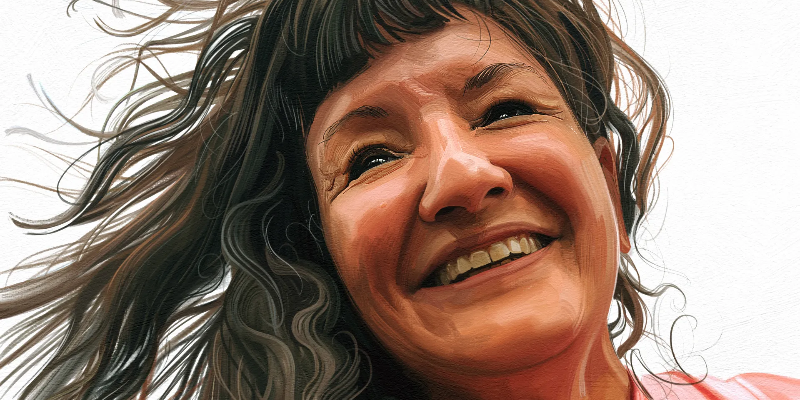
Sandra Cisneros on Her Mother and Studs Terkel
This Week on the Talk Easy Podcast with Sam Fragoso
Illustration by Krishna Bala Shenoi.
Talk Easy with Sam Fragoso is a weekly series of intimate conversations with artists, authors, and politicians. It’s a podcast where people sound like people. New episodes air every Sunday, distributed by Pushkin Industries.
*
This week, we revisit our conversation with beloved author Sandra Cisneros! We discuss her first poetry collection in 28 years, Woman Without Shame, why she chooses to write ‘dangerous’ pieces, and the significance of her poem, “My Mother and Sex.” Then, we walk through Sandra’s coming of age between Mexico and Chicago, the sixth-grade teacher that guided her entry into art, her epiphanies on class in graduate school, the “Pilsen Bario” that shaped her seminal novel, The House on Mango Street, and how Studs Terkel informed her lifelong approach to story.
On the back-half, we discuss the loves and losses that inspired Sandra’s early sensual poems, how she documented her power through “Neither Señorita nor Señora,” a painful period captured in “Year of my Death,” the day her mother visited her writer’s office in San Antonio, and why she still has more to say (and write) at age 67.
Subscribe and download the episode, wherever you get your podcasts!
From the episode:
Sam Fragoso: The schooling your mother found came in the form of Studs Terkel.
Sandra Cisneros: Yeah, she listened to Studs Terkel religiously. Whatever Studs said, any book he mentioned, she would ask us to go get it for her. She was reading all these college textbooks and she’d say, “Hey, you know, I heard about this poet from Chile that Studs was talking about. Do you know who he is?” And I’d say, “Oh yeah, that’s Pablo Neruda.” And she goes, “Yeah, yeah. Get that book from me.” At the end of her life, her favorite writer was Noam Chomsky. She would take a yellow marker and highlight whole pages. She knew so much that she was the most well-read person in the barrio.
Sam Fragoso: God bless her.
Sandra Cisneros: I got my mother to meet Studs Terkel. I was on Studs’ show more than once. Studs was very intrigued by the story of my mom. He wanted to meet her to interview her for one of his books, but my mom was too embarrassed by the idea of him coming to her kitchen table. So instead, I took my mother to the studio, and there’s a photo of Studs and me and my mom together. It was a big moment that my mother got to meet her mentor.
Sam Fragoso: So, Studs became her mentor, and I’m trying to think about the ways in which he informed your writing. You have this quote where you said:
The kind of work I do isn’t just about writing what one hears. You have to do some research. And to me, everybody’s a walking library as valuable as the Library of Alexandria. I write about people I know who aren’t history, and they won’t be in a history book—or they won’t get in a museum.
Sandra Cisneros: Yeah, to me, history books look at people of poverty, women, and people of color as not counting. I interviewed a lot of people for Caramelo to get moments of history that are included in that book. To me, it’s a history book. It’s a history of immigration. There’s even a timeline at the back of the book, so you can see what U.S. attitude toward immigration has been and why it was created.
I just feel like I want to document the people I love— because if I don’t, they don’t count; they’re not history. Lots of people come across my life. I want to write about the Japanese people I worked with when I was fifteen. Many of them were deported to concentration camps during WWII, but I wasn’t aware of that, and they had no bitterness, or maybe they had bitterness but didn’t express it to me. There are parts of my past I haven’t written about. I hope I live long enough to sketch, with love, the people that I’ve been lucky enough to cross paths with.
__________________
Sam Fragoso is the host of Talk Easy with Sam Fragoso, a weekly series of conversations with artists, activists, and politicians. His writing has appeared in The Atlantic, Vanity Fair, and NPR. After conducting seminal interviews with icons like Spike Lee, Werner Herzog, and Noam Chomsky, he independently founded Talk Easy in 2016.
Talk Easy
Talk Easy with Sam Fragoso is a weekly series of intimate conversations with artists, authors, and politicians. It’s a podcast where people sound like people. New episodes air every Sunday, distributed by Pushkin Industries.



















